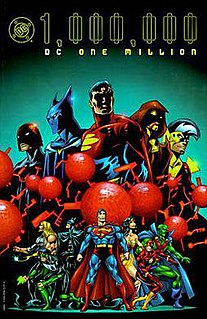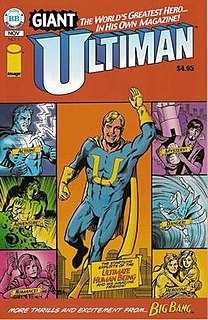Big Bang Comics is a superhero tabletop role-playing game, written by Chris Carter and published by Pisces All Media in 2006. The game uses a modified version of the d20 System .

A superhero is a type of heroic stock character, usually possessing supernatural or superhuman powers, who is dedicated to fighting the evil of their universe, protecting the public, and usually battling supervillains. A female superhero is sometimes called a superheroine, although the word superhero is also commonly used for females. Superhero fiction is the genre of fiction that is centered on such characters, especially in American comic book and films since the 1930s.

A tabletop role-playing game is a form of role-playing game (RPG) in which the participants describe their characters' actions through speech. Participants determine the actions of their characters based on their characterization, and the actions succeed or fail according to a set formal system of rules and guidelines. Within the rules, players have the freedom to improvise; their choices shape the direction and outcome of the game.
This page lists board and card games, wargames, miniatures games, and tabletop role-playing games published in 2006. For video games, see 2006 in video gaming.
Characters in the game exist in either of the two worlds of Big Bang Comics (the Silver Age Earth-A or Golden Age Earth-B). Players may create new heroes or take the part of existing heroes from Big Bang Comics. Characters are created with two character classes: a power origin Entry Class, and a "civilian identity" representing their out-of-costume occupation. The power origin classes include choices such as Mutant, Elite (super-trained normal), Sorcerer, and Mechanical.

Big Bang Comics is an American comic-book series. It first appeared in 1994, with the five-issue miniseries, published by Caliber Comics. A second series was published by Image Comics.
In role-playing games (RPG), a character class is a job or profession commonly used to differentiate the abilities of different game characters. A character class aggregates several abilities and aptitudes, and may also detail aspects of background and social standing, or impose behavior restrictions. Classes may be considered to represent archetypes, or specific careers. RPG systems that employ character classes often subdivide them into levels of accomplishment, to be attained by players during the course of the game. It is common for a character to remain in the same class for its lifetime; although some games allow characters to change class, or attain multiple classes. Some systems eschew the use of classes and levels entirely; others hybridise them with skill-based systems or emulate them with character templates.
The game rules use standard d20 skills with a large range of original "Feats", which in Big Bang include super powers and other abilities. The game is also notable for using "Negative Feats", which functioned as disadvantages for a character, allowing more "Feats" to be chosen as a balance to defects. Although common in other roleplaying systems since the 1980s, this was unheard of in the d20 system and its derivations at that time.
Pisces announced free download-only ebook expansions to its system but to date none have been released.

Galactus is a fictional character appearing in American comic books published by Marvel Comics. Formerly a mortal man, Galactus is a cosmic entity who originally consumed planets to sustain his life force, and serves a functional role in the upkeep of the primary Marvel continuity. Galactus was created by Stan Lee and Jack Kirby and first appeared in the comic book Fantastic Four #48, published in March 1966.

Marvel Super Heroes (MSHRPG) is a role playing game set in the Marvel Universe, first published by TSR as Marvel Super Heroes: The Heroic Role-Playing Game under license from Marvel Comics in 1984. In 1986, TSR published an expanded edition, entitled the Marvel Superheroes Advanced Game. Jeff Grubb designed both editions, and Steve Winter wrote both editions. Both use the same game system.

The Marvel Universe is a fictional universe where the stories in most American comic book titles and other media published by Marvel Comics take place. Super-teams such as the Avengers, the X-Men, the Fantastic Four, the Guardians of the Galaxy, the Defenders, the Inhumans and other Marvel superheroes live in this universe, including characters such as Spider-Man, Iron Man, Thor, the Hulk, Captain America, Daredevil, Wolverine, Black Panther, Doctor Strange, Blade, Ghost Rider, the Punisher, Deadpool, Silver Surfer, and numerous others.

Champions is a role-playing game published by Hero Games designed to simulate and function in a four-color superhero comic book world. It was originally created by George MacDonald and Steve Peterson in collaboration with Rob Bell, Bruce Harlick and Ray Greer.

The DC Universe (DCU) is the fictional shared universe where most stories in American comic book titles published by DC Comics take place. DC superheroes such as Superman, Batman, and Wonder Woman are from this universe, and it also contains well known supervillains such as Lex Luthor, the Joker, and Darkseid. In context, the term "DC Universe" usually refers to the main DC continuity.

The Infinity Gems are six gems appearing in Marvel Comics. The six gems are the Mind, Soul, Space, Power, Time and Reality Gems. In later storylines, crossovers and other media, a seventh gem has also been included. The Gems have been used by various characters in the Marvel Universe.

The Grandmaster is a fictional character appearing in American comic books published by Marvel Comics. The character first appeared in The Avengers #69. The Grandmaster is one of the ageless Elders of the Universe and has mastered most civilizations' games of skill and chance. Different media appearances depict him as the brother of the Collector.

Mutants & Masterminds is a superhero role-playing game written by Steve Kenson and published by Green Ronin Publishing based on a variant of the d20 System by Wizards of the Coast. The game system is designed to allow players to create virtually any type of hero or villain desired.

DC One Million is a comic book crossover storyline that ran through a self-titled, weekly miniseries and through special issues of almost all of the "DCU" titles published by American company DC Comics in November 1998. It featured a vision of the DC Universe in the 853rd century, chosen because that is the century in which DC Comics would have published issue #1,000,000 of their comics if they had maintained a regular publishing schedule. The miniseries was written by Grant Morrison and drawn by Val Semeiks.

Marvel Super Heroes is a fighting video game developed by Capcom. Originally released in the arcade in 1995 on the CPS-2 arcade system, it was ported to the Sega Saturn and PlayStation in late 1997. The game, alongside Marvel vs. Capcom: Clash of Super Heroes, was also included in the Marvel vs. Capcom Origins collection, released digitally for the PlayStation 3 and Xbox 360 in September 2012.

Ultiman is a fictional character published by Big Bang Comics. First appearing in Big Bang Comics #1, he was created by Gary Carlson and drawn by his partner Chris Ecker, among others. There are two existing versions of Ultiman. Metafictionally, the first is from the Golden Age of comics on Earth-B, and the second from the Silver Age of comics on Earth-A. Ultiman has proven to be the most popular of all Big Bang Comics heroes.

Beacon is the name of two fictional characters published by Big Bang Comics. The Beacon of Earth-A is a Silver Age character. The Beacon of Earth-B is a Golden Age character. Both characters first appear in Big Bang Comics #3, and were created by Chris Ecker, Gary S. Carlson and Steve Adams.

Superboy is a fictional superhero that appears in American comic books published by DC Comics. The character was created by Jerry Siegel and Don Cameron and is based on the character of Superman that Siegel co-created with Joe Shuster. Superboy first appeared in the comic book More Fun Comics #101 in 1945.

Superhero fiction is a genre of speculative fiction examining the adventures, personalities and ethics of costumed crime fighters known as superheroes, who often possess superhuman powers and battle similarly powered criminals known as supervillains. The genre primarily falls between hard fantasy and soft science fiction spectrum of scientific realism. Superhero fiction originated from the cultural intermingling of Japan and United States literature. It is most commonly associated with American comic books, though it has expanded into other media through adaptations and original works.

The article alternative versions of Supergirl focuses on stories published by DC Comics in which various incarnations of the character have been placed in storylines taking place both in and outside mainstream continuity.

Huntress is the name of several fictional characters appearing in comic books published by DC Comics, commonly in association with Batman. The two most well known women of the three to bear the Huntress name are Helena Bertinelli and Helena Wayne, the latter being from an alternate DC universe. Although Helena Wayne and Helena Bertinelli are both superheroes, the Huntress of the Golden Age was a supervillain.

The Silver Surfer is a fictional superhero appearing in American comic books published by Marvel Comics. The character also appears in a number of movies, television, and video game adaptations. The character was created by Jack Kirby, and first appeared in the comic book Fantastic Four #48, published in 1966.


















